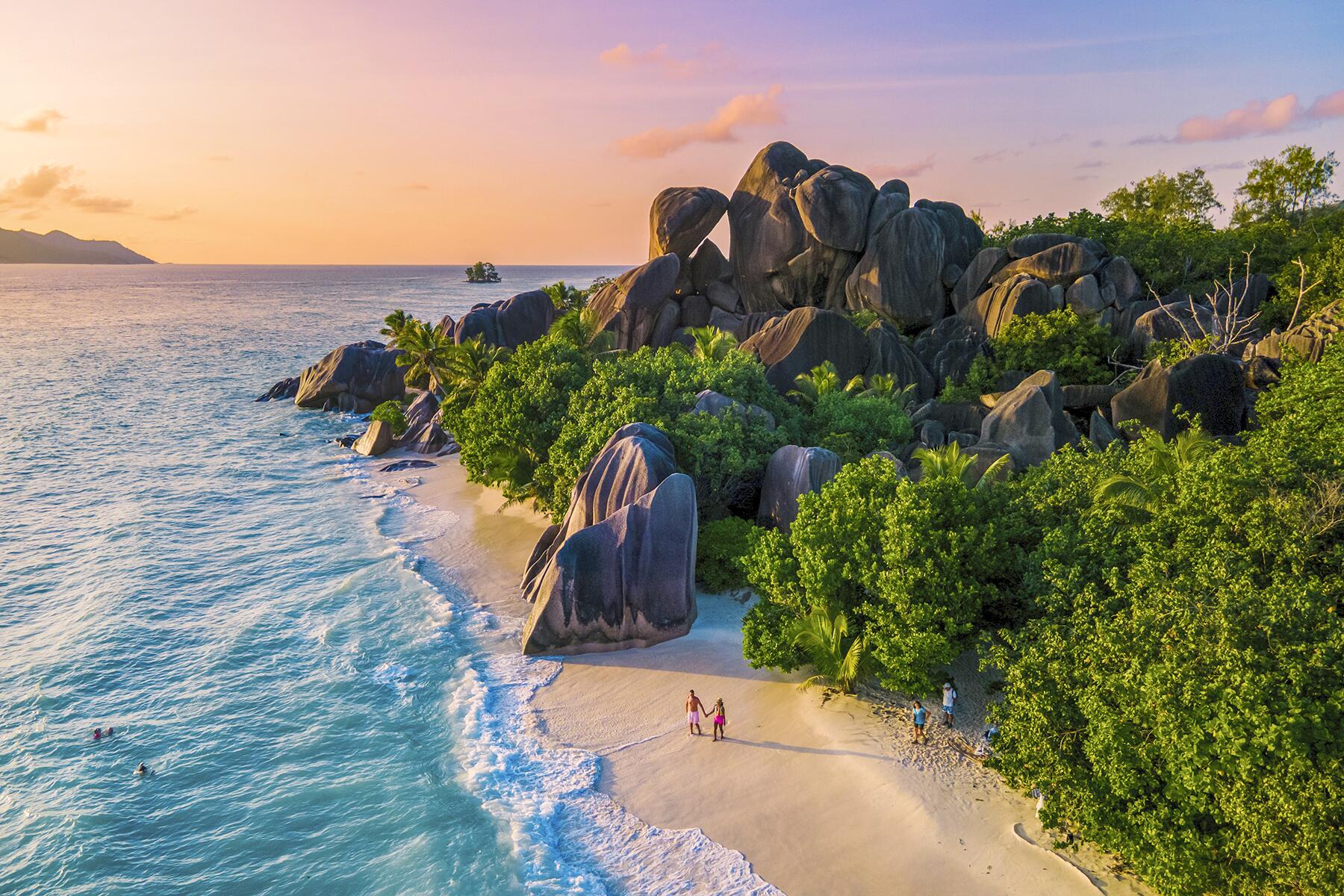Seven travel professionals weigh in on words to consider avoiding while talking or writing about travel.
Travel writers use descriptive words and phrases as tools to convey a sense of place and people. While words such as “colonial,” “explore,” and “exotic” may have at one time conjured up a desirable destination, today they can connotate otherness and unnecessarily glamorize colonialism. They may perpetuate an “us versus them” duality, where the entitled and the underprivileged, whites and non-whites, and the haves and the have-nots, continue to remain separated.
Much of modern travel writing emerged from the field notes of 16th-century colonizers, who shared knowledge of the people and cultures they encountered as propaganda to justify conquest and enslavement. But just because the genre is rooted in colonialism doesn’t mean the old order must persist. Travel is an enriching and enjoyable experience for people of all races, ethnicities, colors, sexualities, abilities, ages, and sizes. It bridges the gap between ourselves and the natural world, opens our eyes to new realities, and makes us more compassionate and appreciative.
It’s time to reconsider many common words that are infused in the global lexicon, as the modern world has no place for them. As travelers, we have a responsibility to be thoughtful in our language. The journey is not always clear and we often wonder what is right or wrong. I too have made these mistakes. I have used some of the words below in the past and cringe when I look back. No one is perfect; all we can do is try. So, in that vein, I’ve tapped a diverse array of writers who are Asian, Black, Indigenous, and Latinx, to share words and phrases to avoid when we discuss travel, so that we all can do better.
Recommended Fodor’s Video
Avoid the Word: Cheap
Kay Kingsman, Travel blogger at The Awkward Traveller
Cheap is a word that is readily thrown around in travel—referring to food and restaurants, activities, businesses, to even entire cities and countries. Its ultimate purpose is to present a destination as attainable to the average traveler. However, using “cheap” in reference to destinations (especially those in the global south) should be more nuanced. For one, “cheap” is relative. Even within the same country, there are cities, usually larger and more populated, that are more expensive due to industry and the people who live there. Their cost of living is vastly different from someone who lives in a smaller city where salaries are reflective of the industries in that area.
In short, what is cheap to some is actually standard or even more expensive to others. When looking outside of one country or even on a completely different continent, the relative cost of living varies due to the global economy. Certain countries have higher GDPs because of their history of resource and labor exploitation of lower GDP countries. Currencies are not all valued at the same rate. Travelers from certain destinations are privileged to face as many costly restrictions or barriers (visas, airport availability/flight prices, financial savings requirements). Those additional “hidden” costs can definitely move destinations above the target “cheap” price point.
Lastly and potentially the most pressing, “cheap” does not have a very positive connotation. Cheap implies low quality, minimal effort or thought, and even desperation. Cheap is applied to things that carry little value. Applying cheap to an entire destination—made up of complex culture, deep history, and real people—is a disservice. So what is the alternative? Usually, when people are looking for a “cheap” destination, it is because they are traveling with a specific budget in mind, so get specific. Offer that a place is “affordable” instead. Detail the cost of accommodations, public transportation, and activities so someone can decide if it is affordable to their circumstances. Always, think about the “why” behind a destination being “cheap.” Is it because their economy is recovering from overexploitation or war? Does their government invest in accessible art programs, healthcare, and transportation that travelers will also benefit from? These considerations open our eyes to the big picture in terms of a destination.
Avoid the Word: Colonial
Meera Dattani, Freelance travel journalist, Editor, and Co-founder of the Unpacking Media Bias Newsletter
The word “colonial” isn’t in itself offensive, but the act of colonizing, of course, was and is. “Colonial” as a descriptor for anything that took place or was built during a problematic period in world history is fine, but it has to be used with care. All too often, travelers talk of “colonial charm” as if charming anyone was the colonizers’ key objective. It’s a word used too freely to evoke images of a bygone era (one that has left an often-devastating legacy) where glasses of gin and tonic clinked across a garden terrace on a balmy night, or to describe albeit spectacular or interesting architecture, without any context as to who built it, why they built it, who benefited from it, or what conditions it was built in.
Features about Central and South America often describe the cities’ atmospheric plazas and colorful homes with the term “colonial charm.” It’s as if the Spanish Crown had nothing but the good of the Indigenous people at heart when it decided to spend money improving their public spaces and housing. Colonial architecture in India was one way for the British to put their stamp on their most “lucrative colony” and while we’re at it, those railways weren’t built to leave the Indian people with an excellent transport network. They were built to speed up the transport of goods that made the British Empire so incredibly rich as it traded spices, fabrics, sugar, and more across the globe.
Colonialism was the very reason for the transatlantic slave trade, a truly hideous period. As a result, those offshoot words of colonialism can’t be used lightly or positively without offering context. Using it without meaning also shows a lack of engagement with the history on the part of the traveler. Likewise, it doesn’t really say anything about the building or town to describe it as “colonial.”
Many places were colonized multiple times so if nothing else, it’s a lazy descriptor as it doesn’t say when. Better to find out the style of architecture, for example, if there is one, and share the year it was built and under whose rule. When it comes to “colonial charm,” there is no alternative. As a traveler, you should describe these places as you find them, talk about the architecture, say when it was built, and say it was beautiful but required forced labor. Glossing over history in the name of “colonial charm” is all harm and no charm.
Avoid the Words: Conquer, Discover, and Explore
Jihan McDonald, Writer
Our contemporary language around travel is heavily influenced by both the European leisure class and the military, it is not surprising that the normalized tone of discourse around travel carries the perspectives of those sociocultural identities and locations.
Armies conquer, not individuals seeking to develop a more expansive understanding of the world; and discovery is purely relative! One need only think back to those adamant souls in Plato’s cave convinced there was nothing more to reality than shadow. Did the one who ventured out “discover” the sun, or merely come to realize that the sun had always been there and they had been ignorant of it? The latter of course calls for a humility not often associated with the upper class or the military so there’s again no surprise that there has not been much thought put into how to shift the perspective.
Rather than adopting the narrative stance of people, we don’t wish to emulate, how about we try on some new ways of describing travel—aka new ways of thinking about travel. Let’s instead use words like “encounter” and “engage,” “locate” and “happen upon,” “seek” and “traverse” when describing a destination. Or if you want to be less existentially angst about it, just go get a thesaurus and stop being so basic.
Avoid the Word: Exotic
Alex Temblador, Award-winning author, and freelance writer
“Exotic” is often used to describe a person, place, or thing that is perceived as “foreign” in comparison to what is considered the “dominant” or “main culture,” which is often white American people and culture. In using this word, we’re indicating that other cultures and communities are completely different, secretive, less than, more glamorous, and/or exist to be gazed upon with wonderment.
The term “exotic” furthers the othering of communities and cultures and indicates to the reader that they cannot possibly relate to the community, the way they live, and the beliefs they have. The usage of the word “exotic” may result in producing negative perceptions of other countries and cultures among travelers, contribute to stereotypes, and further racist and discriminatory behavior by tourists toward the citizens of the area in which they visit.
Even if you take the word “exotic” out of the conversation, you may still unknowingly be exoticizing other communities and cultures. This is easier said than done, however, it can be done by breaking down the barriers between different communities and finding ways to connect. Avoid fetishizing, and instead, humanize.
Avoid the Words: Impoverished, Underprivileged, and Poor
Marinel M. de Jesus, Esq., Brown Gal Trekker / The Porter Voice Collective
Terms such as “impoverished, underprivileged, and poor” originated from the colonial mindset that has become the norm in the tourism industry. Not only do these words perpetuate the disempowerment and harmful stereotypes of the people at the destination but they also yield to the commodification of the status of being poor, underprivileged or impoverished which further promotes the “white savior” mentality among tourists.
These narratives often hide the root systemic cause (e.g. neocolonialism) of the inequities that remain in many communities worldwide and contribute to the culture of “begging” and unhealthy dependency on tourism, which deprives people at travel destinations of their sense of self-sufficiency and self-determination.
When commenting on the economic background of a specific group, it’s important to consciously ask yourself: Why does it matter to make note of it? Is this crucial in describing the destination? Does it serve a purpose or elevate the voices of the region’s people? Focus instead on the strengths of the community or illustrate your description directly from the mouths of its residents.
Avoid the Word: Locals
Johanna Read, TravelEater.net
Similarly, “locals” isn’t always a problematic word, but it can be. “Locals” or “the locals” is often used when describing the people who live at a destination we visit, but I find it’s used more often when that place is less developed or when people have lower incomes. In contrast, “residents” or “citizens” is more frequently used when we talk about people and places that are privileged. Plus, those privileged people are much more likely to be called by their citizenship or residency instead, like “Canadians”, “New Yorkers” or “Parisians”. There’s another nuance to keep in mind too—”locals” might be a term reserved only for individuals who were born and raised there and meant to exclude interlopers who only arrived later.
When I see or hear “locals”, it’s often used in a way that overgeneralizes a whole group of diverse people. It can give the impression that they lack citizenship or permanent residency and imply they’re poor, quaint, or resourceful villagers. It can be infantilizing and othering, giving the impression that the speaker thinks they’re above and better than. I always question why the person chose to use it—it might just be because they don’t know the term for the people who live in that town or they might be being a little lazy with their descriptions. But I encourage everyone to learn the proper name for the individuals and groups that they’re talking about, to think about whether they’d use “locals” versus “citizens” or “residents” when generically describing people in their own country, and to question the impression they might give when saying things like “I bought this from a local” or “the locals there are so friendly”. I’d like for everyone to be described less generically and more respectfully, regardless of how privileged they may or may not be.
Avoid the Word: Tribe(s)
Sandra Jackson-Opoku, Novelist and Travel writer
People tend to use the word tribe very loosely and inaccurately, as a way of erasing distinctions among large groups of people. A tribe is defined as “a social division in a traditional society consisting of families or communities linked by social, economic, religious, or blood ties, with a common culture and dialect, typically having a recognized leader.” While tribal groupings exist in certain contexts, there is a colonial tendency to use that term as a broad, reductive shorthand for people of color, particularly Africans’ “tribal languages,” “tribal conflicts,” “tribal music,” “tribal textiles,” and “tribalism.”
The political units of Nigeria, Kenya, South Africa, Ghana, etc. are nations or countries made up of different ethnicities, just like France, the UK, the US, and China. The presence of Yoruba, Kikuyu, Xhosa, and Asante people predated the formation of modern Nigeria, Kenya, South Africa, and Ghana. Some people may have a traditional leader, like the Asantehene of Ghana, but these are not family or community groupings. They are nations within nations, each of them numbering in the millions. They should properly be referred to as nations or ethnic groups, not tribes.
About the word "affordable": Affordable to whom?
In many of the magazines I read, they feature item after item that don't feel affordable to me at all, yet they obviously feel are affordable for their readers.
If someone were to describe something as "affordable," that simply puts a spotlight on their own economic privilege.
Excellent points and a good read. As an editor and writer of website content, including travel and a whole lot of other stuff, I'll keep this in mind. Using the term "locals" caught my attention in particular. I had to think about it, but I do use it pejoratively, mostly just when talking to friends or in my thoughts. I'm living in a small town temporarily, and I have thought of "the locals" in a way that's definitely not complimentary. I'll just say it's an adjustment. But no matter what my level of tolerance is or is not, everybody deserves respect.
A while back, I wrote an article about (this is awful) "rednecks" in France and how it's not just an American thing. I was young, what can I say? But my point was simply that Americans shouldn't glorify Paris or France as we Americans tend to do because they're regular people like anyone else, but my words were not well chosen. Thanks for the reminder. And a note to some of the other commenters: words have power. We should all choose them wisely.
As you suggest, I've thought about "ditching" those words when talking about my travels; and I respectfully decline to do so because, in my opinion, context is key. Quite frankly, it's good to see that I'm not the only one who has grown weary of some who take it upon themselves to stand on a soapbox nowadays and presume to tell others what to think, and what to say and write and how to say it. I will keep on using those terms when I myself judge it proper to do so; and I urge others of like mind to judge for themselves.
Oh, wonderful! Just what we need: A guide to politically correct speech for the sensitive traveler.
George Orwell would be disgusted but not surprised by this silly attempt to prettify and debase the English language.




I always found the word " locals " to be a positive ...local beaches , local restaurants , local people ...the real deal , authentic, non touristy , beetroot vibes , music, more affordable ...
For the"residents"of the place "locals" can come off as condescending, or offensive. So the point here is to show respect to the "residents" or "Citizens" of a place. A local attraction is okay, but people are not an attraction. That, I see is the point being made here.